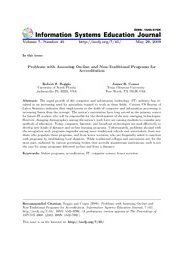Volume 7
Volume 7, Number 45 |
May 29, 2009 |
Abstract: The rapid growth of the computer and information technology (IT) industry has resulted in an increasing need for specialists trained to work in these fields. Current US Bureau of Labor Statistics indicates that employment in the fields of computer and information processing is increasing faster than the average. The nation’s universities have long served as the primary source for future IT workers who will be responsible for the development of the new emerging technologies. However, changing demographics among the nation’s work force are causing students to consider new methods of education. Today, computer, Internet, and broadcast technologies are used effectively to develop new kinds of distance and on-line learning programs. Unfortunately, problems abound with the recognition such programs engender among more traditional schools and universities, from students who populate these programs, and from honor societies, who are frequently asked to sanction such programs by establishing local chapters. While traditional colleges and universities are, for the most part, endorsed by various governing bodies that accredit mainstream institutions, such is not the case for many programs delivered on-line and from a distance.
Keywords: Online programs, accreditation, IT, computer science, honor societies
Download this issue: ISEDJ.7(45).Roggio.pdf (Adobe PDF, 10 pages, 476 K bytes)
Preview the contents: Roggio.j.txt (ASCII txt, 28 K bytes)
Recommended Citation: Roggio and Comer (2009). Problems with Assessing On-line and Non-Traditional Programs for Accreditation. Information Systems Education Journal, 7 (45). http://isedj.org/7/45/. ISSN: 1545-679X. (A preliminary version appears in The Proceedings of ISECON 2008: §2342. ISSN: 1542-7382.)
